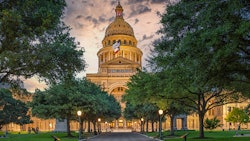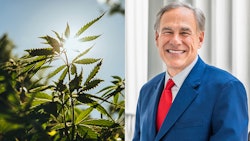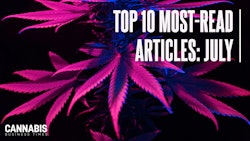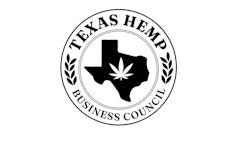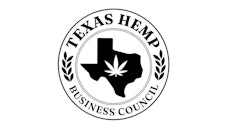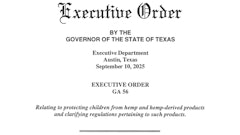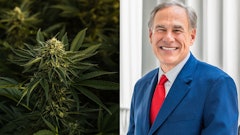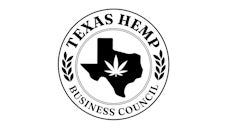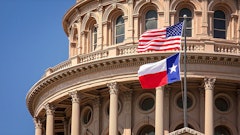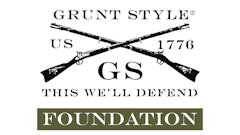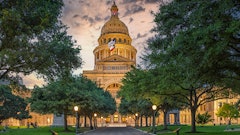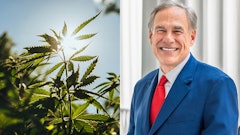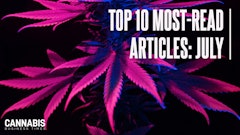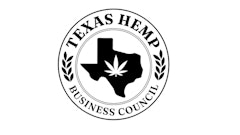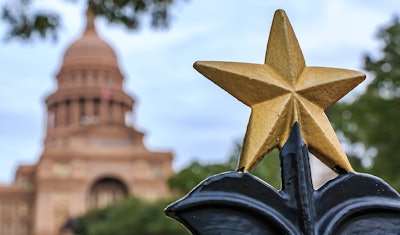
If nothing changes, then nothing changes—at least when it comes to a Texas GOP infight over whether to ban or regulate consumable hemp products containing trace amounts of THC or other intoxicating cannabinoids.
Texas Lt. Gov. Dan Patrick and the Texas Senate played Gov. Greg Abbott for a fool yet again, as the upper chamber’s lawmakers voted, 22-8, on Aug. 18 to pass legislation that disobeys the governor’s proclamation for a second special session, in which he called on the Legislature to regulate hemp products rather than ban them.
As the presiding officer of the Senate, Patrick championed similar legislation in the regular session that Abbott vetoed in June because he didn’t want to criminalize a “lawful agricultural commodity.” Still, Patrick and Senate Republicans remain steadfast in their prohibitive approach, despite the Texas Constitution barring state lawmakers from passing legislation in a special session that veers from the governor’s call.
The latest legislation, Senate Bill 6, mirrors what the Senate passed in the first special session: to prohibit the manufacture and sale of products containing hemp-derived compounds other than nonintoxicating CBD or CBG.
Sen. Charles Perry, R-Lubbock, sponsors the legislation.
“It’s the same bill we passed out in the first special session; nothing’s changed other than the fact that more and more information comes out every week regarding the impact and effects of THC on the brain, the body and long-term use,” Perry said Monday evening before the floor vote on S.B. 6. Perry claimed polls support his position and drives the conversation toward “legitimate science” that “this stuff is not good and it’s harmful for those that use it, specifically on a long-term basis.”
While Perry and his fellow senators passed an identical bill in the first special session, that bill ultimately failed to make it to Abbott’s desk for consideration because 57 House Democrats broke quorum—or prevented the lower chamber from conducting legislative business—by leaving the state to protest a GOP redistricting plan.
However, Texas House Democratic Caucus Chair Gene Wu and his fellow liberals returned to the Capitol this week in Austin, allowing the House to reach a quorum on Monday to conduct its legislative business for the second special session. This means hemp THC prohibition remains a real threat to roughly 8,000 businesses that provide a $10.3 billion economic impact on the state, employing some 50,000 workers, according to Whitney Economics.
Once S.B. 6 passes the Senate on a procedural third reading, it will officially arrive at the House.
“Texas bill S.B. 6 just passed in the Senate to ban hemp with no public testimony allowed,” Texas-based Hometown Hero CEO Lukas Gilkey wrote on X. “We are watching the Texas Senate flaunt their corruption to all Texans while completely ignoring the will of their constituents. This is an embarrassment to all Texans and should be a crime.”
Under S.B. 6, the crime would be applied to those who merely possess a consumable hemp product containing any amount of a cannabinoid other than CBD or CBG, which would be a Class C misdemeanor punishable by a $2,000 fine and a maximum of 180 days in jail.
In their fight to stop the ban, industry advocates point to a June 2025 poll from the University of Texas/Texas Politics Project that revealed 53% of likely Texas voters oppose a THC hemp product ban, while 31% support a ban.
And they point to a March 2025 poll conducted by Baselice & Associates Inc. showed that 68% of likely Texas voters supported regulating THC hemp products versus 20% who supported a ban. That poll also found that Republican voters support allowing THC to remain legal (57%) at double the rate at which they want it banned (29%).
Ironically, an August 2025 poll that was also conducted by Baselice & Associates Inc. showed very different results: 62% of likely Texas Republican voters supported a ban, while 30% supported allowing THC products to remain available.
Gilkey accused Patrick of paying off the Austin-based research organization in the latter poll to provide the results that backed the lieutenant governor’s agenda.
“Lieutenant Governor of Texas Danny P paid a pollster $755,000 to find results that he was happy with because he wasn’t happy with their previous poll results that showed most Texans want hemp to be legal,” Gilkey said Aug. 16. “So, what do they do? They put these highly loaded questions that would not qualify for any sort of poll reliance whatsoever, and they actually use those questions to find results that Dan Patrick was happy with. … He’s paid them $755,000 to find results that make him not look like an idiot.”
One of the survey questions in the latter poll asked respondents which viewpoint about THC comes closest to their own:
- THC products need to be banned in Texas because we need to protect children and adults from dangerous THC products that are causing erratic behavior, severe mental and sometimes permanent brain damage, and even death.
- THC products should remain available for sale in Texas because they offer Texans the freedom to get high for many people.
Regardless of the discrepancies in Baselice polls, S.B. 6 appears inevitable for consideration in the Texas House, where lawmakers voted, 95-44, in May, to pass a similar version of the hemp THC ban in the regular session.
While it’s unclear if Abbott would veto S.B. 6 should it arrive at his desk, the timeline in which the House potentially passes the legislation matters. If the bill is presented to the governor fewer than 10 days (not counting Sunday) before final adjournment, then the Texas Legislature cannot exercise its two-thirds majority power to override a veto.
In Texas, special sessions can last no longer than 30 days. This means the Legislature would need to send Abbott S.B. 6 by Sept. 3—10 days before the sine die adjournment date—to retain its power to override a potential veto. The last time the Texas Legislature overrode a veto was 1979.
Specifically, Abbott clarified his position last month that cannabinoid hemp products should only be available to those 21 years or older, consumable hemp products containing synthetic cannabinoids like delta-8 THC should be banned, and all other products should be regulated and limited to 0.3% THC or 3 milligrams of THC.
Should the Texas Legislature continue to ignore his call for regulation, Abbott could leave the subject off his call list entirely if a third special session comes to order.










